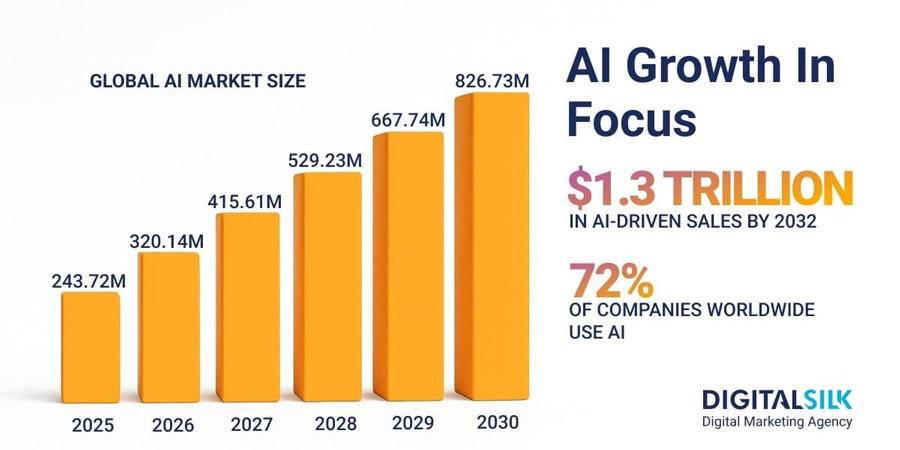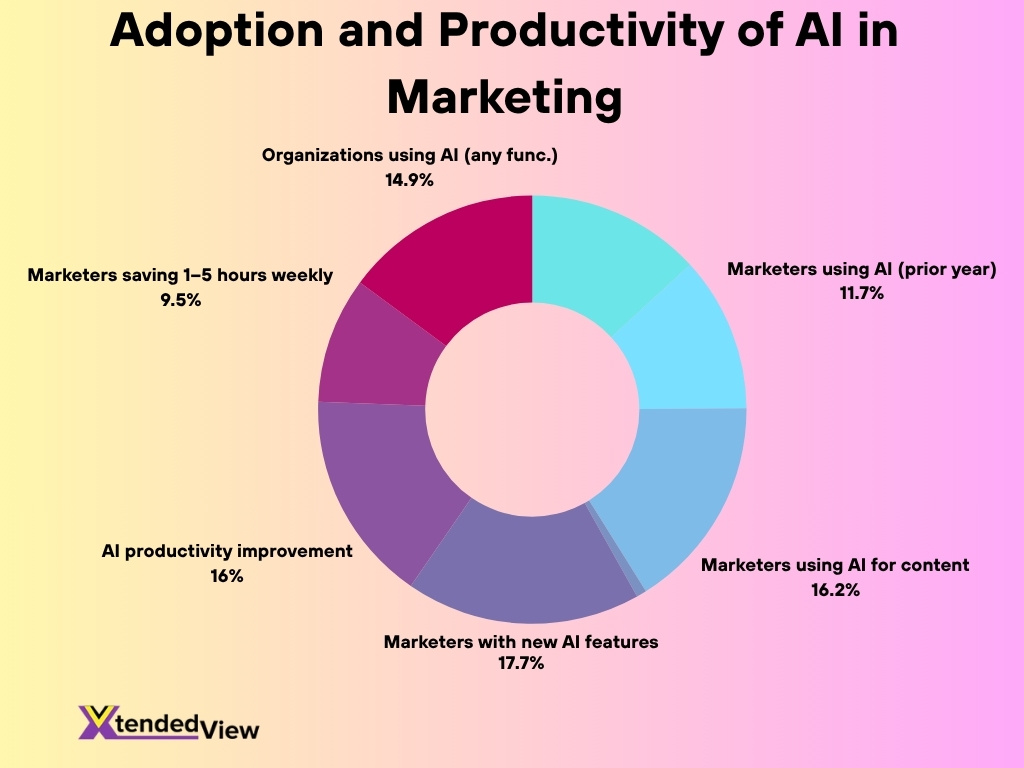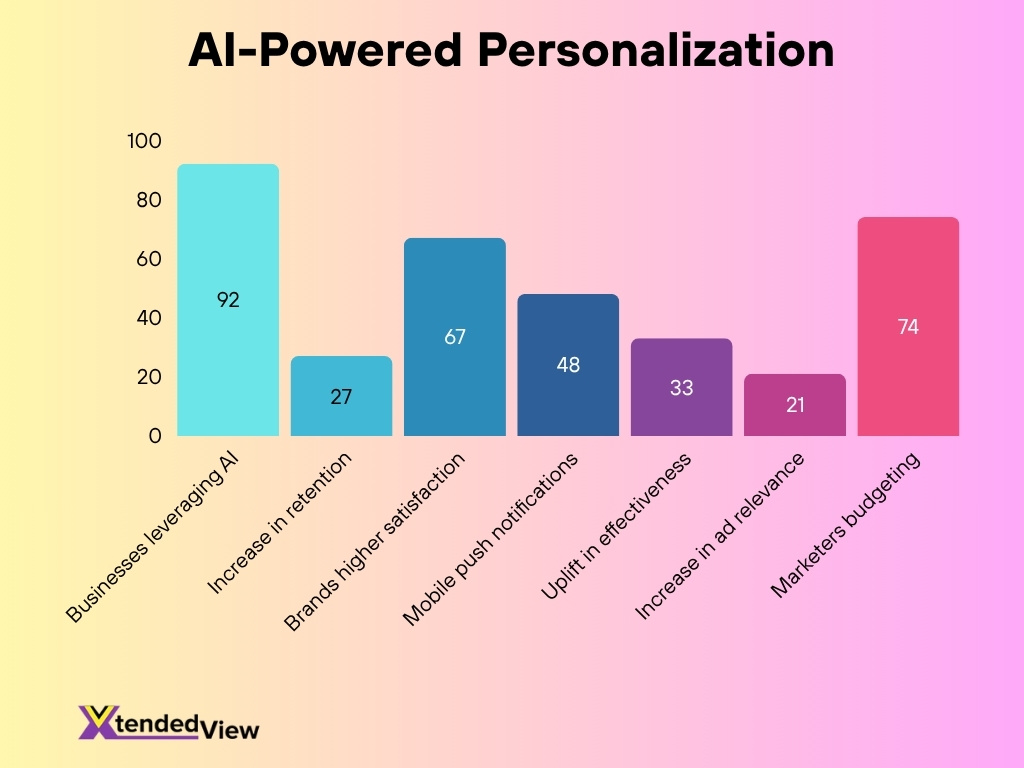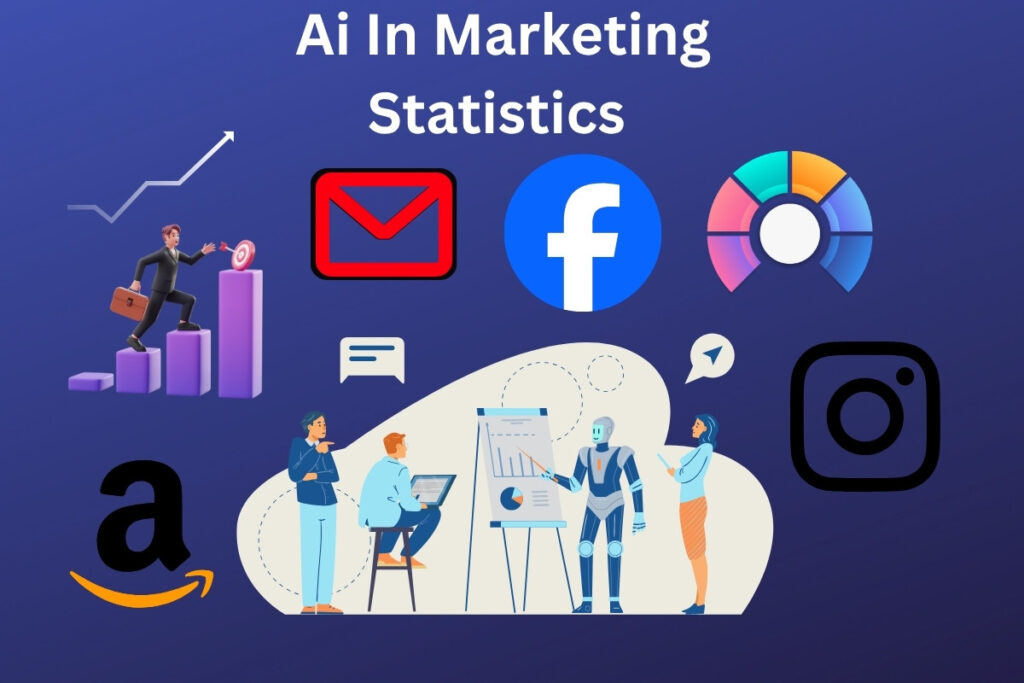Introduction
AI is rapidly reshaping how brands reach customers, personalize campaigns, and analyze data. Marketers are no longer experimenting; many treat AI as essential infrastructure. From automated ad bidding to content drafting and predictive lead scoring, AI already powers core marketing workflows in sectors such as e-commerce and financial services. Below you’ll find a deep dive into the key statistics driving this shift, and why they matter.
Editor’s Choice
Here are seven standout stats that define AI’s trajectory in marketing today:
- 78% of organizations reported using AI in 2024, up sharply from 55% in the prior year.
- The global AI in marketing market reached an estimated $20.44 billion in 2024.
- In 2025, AI in marketing is projected to $47.32 billion globally.
- 69.1% of marketers in 2024 said they already use AI in marketing strategies, up from 61.4%.
- 83.82% of marketers using AI report increased productivity since adoption.
- AI is expected to grow from $20.28 billion in 2024 to $189.65 billion in 2033 in the generative AI segment.
- North America held ≈ 32.4% of the AI in marketing market in 2024.
Recent Developments
- Corporate AI investment soared to $252.3 billion in 2024, with private investment rising 44.5% year over year.
- Advertising-focused AI is getting more attention, the IAB’s 2025 report says, agencies still underutilize full AI capabilities across media campaigns.
- Over 59 AI‑related regulations were introduced by U.S. federal agencies in 2024, more than double the prior year.
- 93% of marketers said new AI features were added in their toolset.
- 92% of companies plan to invest in generative AI in the next three years.
- AI usage in business jumped from 55% in one year to 78%.
- 78% of organizations now use AI in at least one business function.
- In 2025 the broader AI market is estimated at $371.7 billion globally.
AI Marketing Growth Statistics
- From $20.44 billion in 2024, the global AI in marketing sector is projected to expand at a CAGR of 25.0% (2025–2030) toward $82.23 billion by 2030.
- AI marketing is $47.32 billion in 2025, up from $12.05 billion in 2020.
- The generative AI market is forecast to grow at ~28.2% CAGR from 2024 to 2033 (from $20.28B to $189.65).
- The AI in marketing market may hit $214 billion by 2033, up from ~$20B in 2023.
- North America accounted for about 32.4% of the market in 2024.
- Asia-Pacific is projected to show the fastest regional growth from 2025 to 2030.
- The broader AI industry is forecast to reach $2.4 trillion by 2032.
- In 2025, the AI market value is estimated at $371.7 billion globally.

AI Marketing Adoption Statistics
- 69.1% of marketers in 2024 reported using AI tools in their strategies.
- That’s up from 61.4% the prior year.
- In a 2025 marketing survey, 85% of marketers said they use AI for content creation.
- Only 3.98% of companies say they are unwilling to integrate AI.
- 93% of marketers reported new AI features were added to their tech stacks in 2024.
- 83.82% of marketers say AI adoption improved productivity.
- Roughly 50% of marketers say AI saves them 1–5 hours weekly.
- 78% of organizations now use AI in at least one function.

AI Marketing Market Size and Revenue
- The AI in marketing market was $20.44 billion in 2024.
- Projected to reach ~$82.23 billion by 2030 (25% CAGR).
- $47.32 billion is estimated for 2025.
- The generative AI subsegment moves from $20.28 billion in 2024 to $189.65 billion by 2033.
- The global AI market overall is forecast to hit $2.4 trillion by 2032.
- AI marketing may hit $214 billion by 2033.
- In 2024, North America held ~32.4% share of the AI marketing market.
- Asia-Pacific is forecast to lead post‑2025 in growth pace.
Key Benefits of AI in Marketing
- 83.82% of marketers say AI improved productivity.
- About half report saving 1–5 hours/week via AI.
- Nearly 75% of marketers say AI gives them an edge.
- 25.6% report AI content outperforms non‑AI content.
- AI enables content, email, and campaign scaling without proportional headcount.
- 93% saw new AI features added in 2024.
- Marketers deploy AI for content optimization, personalization, automation, social monitoring, and customer journey mapping.
- Only 3.98% of companies currently resist integrating AI.
AI‑Driven Personalization
- Around 92% of businesses are already leveraging AI for personalization in marketing.
- 73% of business leaders say AI will fundamentally reshape personalization strategies.
- AI personalization has driven a 27% increase in customer retention in 2025.
- 67% of brands report higher customer satisfaction when applying hyper‑personalized digital experiences.
- 48% of mobile push notifications are now AI‑personalized based on user data and behavior.
- AI-based segmentation yields a 33% uplift in personalization effectiveness.
- Real-time customer segmentation using AI contributes to a 21% increase in ad relevance scores.
- 74% of marketers now allocate budget to AI algorithms that segment audiences beyond demographics.

AI Automation and Efficiency in Marketing
- 72% of marketers who use AI and automation report that they personalize customer experiences using those tools.
- Marketers save on average 3 hours per content piece and 2.5 hours daily using AI assistance.
- 80% of retail executives expect broad AI adoption by 2025 to boost efficiency.
- 93% of marketers saw new AI features added to their toolsets in 2024.
- 56% of marketers say their companies are actively implementing AI.
- 32% of marketing organizations have fully implemented AI, 43% are experimenting.
- 90% of marketers using AI say it helps speed up decision-making.
- 81% of AI‑using marketers say AI helps uncover insights more quickly.
AI in Content Creation and Distribution
- 93% of marketers using AI apply it primarily to content generation and ideation.
- Companies with AI‑driven content strategies see ~20% higher ROI on marketing spend.
- 75% of midsize and large organizations will use AI tools to personalize content by 2025.
- AI metadata applied to user‑generated content increases views by 7.1% and duration by 4.1%.
- Among marketers using AI, 51% use it to optimize content, 32% to create content, 40% for research.
- AI-written content is often edited; fully automatic generation remains a smaller share.
- AI tools help reformat content for different channels at scale, reducing manual adaptation effort by up to 50%.
- AI enables content distribution optimization through predictive timing, channel selection, and automated delivery.
Programmatic Advertising and AI
- Nearly 90% of digital display spend will be programmatic in 2025.
- Only 30% of agencies, brands, and publishers have fully integrated AI across the media campaign lifecycle so far.
- Programmatic advertising spend is expected to surpass $200 billion by 2026.
- The programmatic advertising market is forecast to grow from $23.50 billion to $235.71 billion by 2033.
- AI in programmatic enables real‑time bidding, creative optimization, bid adjustments, and audience targeting.
- 83% of senior brand marketers say they use AI for targeting digital ads.
- CTV and programmatic video are rising fast as key components of programmatic strategies.
- In the U.S., programmatic is projected to account for 91.1% of all digital display ad spending in 2025.
Predictive Analytics in Marketing
- The predictive analytics market is forecasted at $23.70 billion in 2025.
- It is expected to grow at a 28.3% CAGR toward $82.35 billion by 2030.
- 95% of companies now include AI‑powered predictive analytics in their marketing strategies.
- Forecasting accuracy in AI models can improve by ~47% compared to traditional methods.
- AI-driven analytics accelerate decision‑making speed by 78% in marketing departments.
- 53% of marketing leaders already use or plan to use AI for predictive analytics and customer insights.
- 65% of senior executives identify AI and predictive analytics as primary growth drivers in 2025.
- 61% of senior executives say personalized experiences driven by AI are critical for growth.
AI‑Generated Customer Insights
- 81% of marketers using AI say it helps them discover new patterns or insights faster.
- 53% of marketing leaders actively use or plan to use AI for customer insights.
- Generative AI and real-time analytics are enabling faster, more precise consumer profiling.
- Cloud platforms and integrated data pipelines enable seamless insight generation.
- AI can detect non-obvious correlations that manual analysis often misses.
- Customer journey mapping with AI reveals drop-off triggers and micro‑moments with higher fidelity.
- AI insight tools reduce manual reporting time by 50–70%.
- Insights generated via AI help dynamically adjust campaign strategies mid-flight.
AI Tools for Marketing: Types and Use Cases
- 93% use AI for content generation, 81% to uncover insights, and 90% for faster decision-making.
- 87% of respondents use AI to help create content.
- Companies using AI publish a median of 17 articles per month vs. 12 for non-AI users.
- ChatGPT is used by 44% of respondents, followed by Gemini (15%) and Claude (10%).
- Only 4% of respondents publish purely AI‑generated content.
- Use cases include brainstorming, outlining, content updates, SEO optimization, segmentation, automated email drafting, and ad copy generation.
- AI is used for blog posts (58%), social media posts (55%), short articles (49%), video clips (31%), and emails (29%).
ROI and Performance Metrics of AI Marketing
- Companies using AI in marketing report 22% higher ROI, 47% better click-through rates, and campaigns that launch 75% faster.
- Organizations investing in AI see 10–20% improvement in sales ROI.
- 66% of marketers using generative AI have seen a positive ROI.
- 68% of companies have noticed growth in content marketing ROI since adopting AI.
- 83% of marketers using AI say they increased productivity after adoption.
- AI saves marketers more than 5+ hours every week, on average.
- Only 49% currently measure ROI of AI investments, and 22% plan to start in 2025.
- Only 5% of companies are truly deriving measurable value from AI investments.
Challenges of AI in Marketing
- 40.44% of marketers cite data privacy concerns as a top reason for hesitating to adopt AI.
- 37.98% say lack of technical expertise is a barrier.
- 33.17% identify implementation cost as a challenge.
- 28.61% mention difficulties integrating AI into existing systems.
- 50% expect performance expectations to climb as AI adoption rises.
- 49% expect changes in tools or software due to AI.
- 48% say strategy or direction may need to change.
- 31% express concerns about the accuracy and quality of AI outputs.
- 60% of companies see little to no benefit from AI.
Data Privacy and Ethical Considerations
- One‑third of gen AI users report encountering incorrect or misleading information.
- 24% of users report having experienced data privacy issues.
- 53% of users say they verify AI outputs independently.
- 40.44% cite privacy as the top hesitation in AI adoption.
- Ethical issues include bias in training data.
- Users often don’t know how AI models make decisions.
- Compliance requirements are rising with regulations like GDPR and CCPA.
- Transparency, opt-out, and explainability become vital for consumer trust.
Impact of AI on Marketing Jobs and Team Structure
- 84% of marketers report no decline in team size after AI adoption.
- AI enables teams to scale output without increasing headcount.
- Roles are shifting to AI supervisors, prompt engineers, and insight auditors.
- Companies that train employees in AI report 43% higher success in deployment.
- Only 5% of companies extract real value, often due to a lack of organizational alignment.
- Many see task augmentation rather than replacement.
- Leadership roles demand strategic, data‑oriented, and cross‑functional skills.
- AI adoption often requires new governance roles in marketing teams.
Consumer Sentiment Toward AI Marketing
- 70% of marketers expect AI to play a larger role in their work.
- 90% of people still prefer human customer service over a chatbot.
- 41% of people under 34 and 72% over 65 express negative feelings about AI in customer experience.
- One-third encountered incorrect info from AI, 24% had privacy concerns.
- 53% verify AI outputs independently.
- Transparency about AI use is critical for trust.
- Consumers want opt‑out or human options when interacting with AI.
- Expectations for personalization are high, but errors trigger backlash.
AI Marketing Trends and Future Predictions
- $47.32 billion in 2025, projected to reach $107.5 billion by 2028 with a 36.6% CAGR.
- Generative AI will continue expanding across marketing.
- ROI measurement will become standard practice.
- AI will evolve into autonomous agents.
- Tools will become more specialized by function and channel.
- Integrations with CDPs, CRM, and omnichannel platforms will deepen.
- Regulatory pressure will demand explainable and compliant AI systems.
- AI will support emerging formats like AR/VR, IoT, and voice.
- Use of synthetic data will rise to preserve privacy while training AI.
Frequently Asked Questions (FAQs)
69.1%
$47.32 billion
36.6% CAGR
74.2%
85.84%
Conclusion
AI is no longer a marketing experiment; it’s a foundational tool. From higher ROI, faster campaign deployment, and deep personalization, to new team roles and ethical frameworks, the impact is multifaceted. Yet adoption carries real challenges, measuring returns, ensuring trust, protecting privacy, and investing in human capability.
Brands that succeed will balance ambition with responsibility, deploy AI pragmatically, govern it ethically, and build teams equipped to lead the shift.


